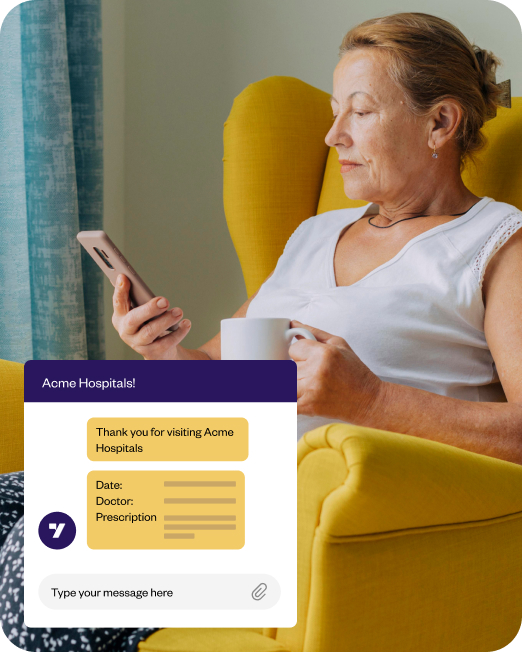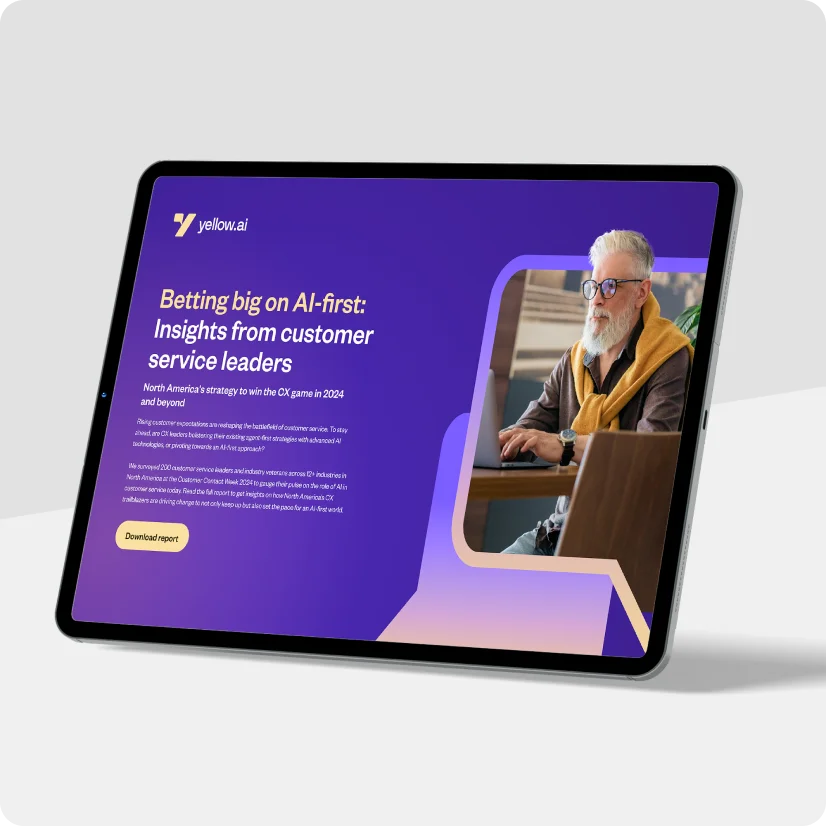The rise of conversational AI in healthcare: The ultimate guide
The integration of conversational AI in healthcare has ushered in an era of revolutionary change, effectively bridging the gap between patients and quality care. With conversational AI for healthcare, the healthcare industry has harnessed the power of intuitive interaction, providing prompt, accurate, and empathetic responses. Whether it’s about assisting patients, streamlining operations, or ensuring seamless communication, healthcare conversational AI is proving its mettle. Diving deep into this subject, our article elucidates how healthcare and conversational AI synergize for better outcomes and how this is reshaping the healthcare industry.
Imagine a world where patient care doesn’t begin in the waiting room but the moment they think of a health query. That’s the transformative impact conversational AI is having on healthcare. While it’s true that chatbots have already paved their way into customer service across industries in healthcare, their significance is unparalleled. By the end of 2023, 75% of healthcare institutions are expected to invest in conversational AI, emphasizing its prominence.
The potential of conversational AI in healthcare isn’t just about technology; it’s about reshaping patient experiences and making healthcare more accessible.
Quotes a leading AI researcher, Dr. Alan Turing.
The future isn’t just coming; it’s already here. And with this guide, we’ll delve into how conversational AI is not just a fleeting trend but a substantial pivot toward holistic healthcare.
Related read: Conversational AI – A complete guide for [2023]
Introduction to conversational AI in healthcare
The essence of communication is evolving in today’s world. Conversational AI is an amalgamation of machine learning, natural language processing, and boundless data that offers a human-like interaction but with the precision and efficiency of technology. Think of it as an intelligent interface that understands, processes, and replies to user inquiries like a human yet harnesses the vast knowledge database only a machine could access.
The World Health Organization paints a somber picture with a deficit of over 4.3 million healthcare professionals globally. As healthcare systems grapple with these staggering shortages, conversational AI emerges as a beacon of hope. Its promise? To enhance patient experience, elevate administrative workflows, and make healthcare more attainable and cost-effective. While there’s no disputing the irreplaceable expertise and compassion healthcare professionals bring to the table, technology, specifically conversational AI, can empower them further. It acts as an adjunct, streamlining their operations, extending their reach, and ensuring that care is accessible to everyone, everywhere.
The future of conversational AI in healthcare
As we stand on the brink of an AI-driven revolution, the future of healthcare looks transformative. Conversational AI, which currently offers innovative solutions for patient interactions, is projected to herald unparalleled advancements in the coming years. With predictions indicating potential savings of up to $150 billion annually by 2026 through its applications, the trajectory for conversational AI in healthcare is skyward.
1. Streamlining administrative operations
The bureaucratic side of healthcare—appointments, insurance claims, billing—often takes away from the primary focus: patient care. Conversational AI promises to redefine this landscape. By automating these foundational tasks, we foresee more efficient systems, a notable reduction in human error, and the liberating of healthcare professionals to devote more time where it matters most: with their patients.
2. Empowering patient engagement
The age of passive patients has passed. The future lies in proactive patient participation facilitated by AI. Virtual health assistants, capable of addressing a spectrum of health-related queries, are set to be commonplace. They’ll serve as timely reminders for medication, help monitor health metrics, and even offer health advice—ensuring that patients remain at the heart of the care narrative.
3. Customized care at one’s fingertips
One-size-fits-all is a relic of the past. The upcoming era is about bespoke healthcare solutions tailored to individual needs. AI-powered chatbots will dive deep into patient data, discerning unique patterns and histories, leading to personalized care recommendations. The benefits? Enhanced patient experience and better health outcomes.
4. The dawn of advanced telemedicine
The global health crisis has already showcased the invaluable role of telemedicine. Conversational AI will propel this further. AI will facilitate seamless remote consultations, especially beneficial for those in remote or underserved locations, ensuring that quality healthcare knows no geographical bounds.
5. Catalyzing medical research
The medical research domain is vast, with an ocean of data waiting to be explored. Conversational AI is going to be the lighthouse in this exploration. From accelerating drug discovery to sifting through copious amounts of data for trend identification, AI-driven language models are the key to faster, more efficient medical breakthroughs.
Must read: 10 Top conversational AI platforms in 2024
Benefits of conversational AI in healthcare
Conversational AI is poised to redefine the healthcare experience, and its myriad benefits underscore this potential:
1. Multilingual support
Language barriers can impede access to vital healthcare information in a diverse world. Conversational AI, with its multilingual capabilities, ensures that a broader patient demographic receives the care and support they need, regardless of the language they speak.
2. 24/7 availability
Health concerns don’t adhere to a 9 to 5 schedule. With conversational AI, patients are reassured by round-the-clock assistance, providing timely information and support, even during off-hours.
3. Data-driven decisions
Conversational AI excels in collecting and deciphering patient data. This trove of insights aids healthcare professionals in making more informed decisions, enhancing patient outcomes, and tailoring treatments more effectively.
4. Operational efficiency & cost savings
Automation of routine tasks, from insurance verifications to appointment bookings, means a significant reduction in operational expenses. More importantly, it allows healthcare professionals to redirect their focus to what truly matters: patient care.
5. Enhancing patient engagement
The post-treatment journey is as crucial as the treatment itself. Conversational AI ensures sustained patient engagement through personalized reminders, be it for medications or follow-ups, thus ensuring continuity in care.
Conversational AI use cases in healthcare
Conversational AI’s footprint in healthcare extends far beyond rudimentary chatbots. Its multifaceted applications touch upon various realms:
1. Streamlined appointment scheduling
Beyond mere booking, AI systems, including platforms like Yellow.ai, allow patients to search for specialists and reschedule or cancel appointments, all through an intuitive conversational interface.
2. Addressing queries efficiently
An overwhelming majority prefer self-service for basic inquiries. Conversational AI systems provide immediate answers to questions about symptoms, prescriptions, or any other health-related topic.
3. Proactive health tracking
With their timely nudges for medication, workouts, or medical appointments, AI tools become indispensable partners in one’s health journey.
4. Administrative task automation
From patient registrations to insurance verifications, conversational AI streamlines the administrative labyrinth, enhancing operational efficiency.
5. Patient assistance and information dissemination
Accessibility is key. Conversational AI ensures patients and healthcare providers have immediate access to lab results, medical histories, and other critical data. Furthermore, during public health crises like the COVID-19 pandemic, it plays a pivotal role in spreading vital information.
Pros and cons of conversational AI in healthcare
While Conversational AI is transformative, it’s also imperative to navigate its landscape with an awareness of its strengths and areas for growth:
Pros:
- Immediate responses: Speedy, accurate information at your fingertips.
- Personalization: Tailored interactions based on individual patient data.
- Cost efficiency: Savings from automating routine tasks.
- Consistent accuracy: Unlike humans, AI doesn’t have off days.
Cons (Opportunities for Improvement)
- Security concerns: Safeguarding patient data remains paramount.
- Human oversight necessity: AI recommendations require human validation.
- Training impediments: Comprehensive training is essential for medical professionals and AI tools to ensure synergy.
Conversational AI strategy for healthcare institutions
Implementing Conversational AI effectively in a healthcare setting requires a strategic approach. The journey encompasses several stages:
1. Discovery
Start by pinpointing the challenges and mapping out possible AI solutions. Whether you’re a private healthcare entity aiming for increased revenue or a public institution striving for cost optimization, clear goals and KPIs are pivotal.
2. Implementation and refinement – data preparation
Conversational AI thrives on data. Sources within the institution, such as customer feedback and chat logs, can be harnessed. For a tool like Yellow.ai, at least 10-20 examples per intent ensure better query understanding. After that, charting out the dialogue flow helps in refining bot responses.
3. Integration
The true potential of conversational AI is unlocked when integrated with existing systems like calendars, CRMs, or electronic medical health records. Depending on the platform, like Yellow.ai, this might never require coding, and it can be seamlessly integrated into your existing tech infrastructure.
4. Testing
Rigorous testing guarantees the AI tool’s efficiency. Initial tests should align with the AI’s training. A well-structured test set mirroring real user questions is essential. Monitoring metrics like the Coverage Ratio can provide insights into the bot’s efficiency and areas for improvement.
Stepping into the future: Conversational AI’s pivotal role in healthcare
Conversational AI is akin to a rising star in the healthcare universe, illuminating new pathways to enhanced patient care, operational efficiency, and groundbreaking innovations. As we navigate through the nuances of its transformative power, it’s evident that while conversational AI will never supplant the human touch, it certainly augments it, crafting a symphony of technology and humanity. It’s not a question of if but when every healthcare institution will harness this tool to elevate its services. The juncture is opportune for stakeholders to embrace, adapt, and integrate. (www.disabilityhelpcenter.org)
Ready to explore how conversational AI can redefine your healthcare operations? Book a demo with Yellow.ai and commence a journey toward unparalleled patient experiences and operational excellence.
Frequently asked questions (FAQs)
What are the benefits of conversational AI in healthcare?
Conversational AI revolutionizes healthcare by offering round-the-clock patient support, streamlining administrative processes, fostering proactive patient engagement, and delivering personalized care experiences.
How is AI used in the healthcare industry?
AI plays a multifaceted role in healthcare, ranging from diagnostic tools, remote patient monitoring systems, and surgical assist bots to conversational interfaces that manage administrative tasks.
What type of AI is used in healthcare?
Healthcare predominantly employs conversational AI, leveraging machine learning (ML) and natural language processing (NLP) techniques to facilitate automated, intuitive interactions.
What are the pros and cons of AI in healthcare?
Pros encompass enhanced patient care, resource optimization, and error reduction. However, challenges include adapting to technological shifts and ensuring data security and privacy.
What are the benefits of AI chatbot in healthcare?
AI chatbots in healthcare provide uninterrupted patient support, medication reminders, and preliminary diagnostics and ensure efficient, hassle-free interactions without direct human intervention.
How AI is transforming the future of healthcare?
From introducing telemedicine bots for remote clinical services to expediting symptom recognition and appointment scheduling, conversational AI is redefining patient care and operational workflows.
What are the new innovations in AI in healthcare?
Modern AI innovations include NLP-driven chatbots that enable swift data retrieval and AI systems that archive comprehensive patient histories, aiding physicians in timely interventions and precision care.















